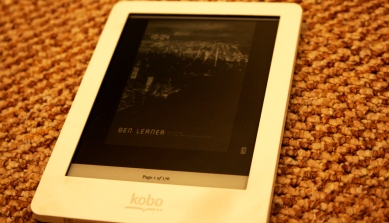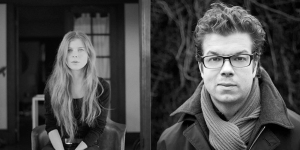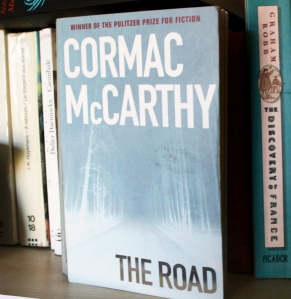Since its publication in September 2014, New York-based writer Ben Lerner’s second novel, 10:04, has drawn praise from all corners of the publishing world and was recently announced on the shortlist for the prestigious Folio Prize 2015. As far as I can tell, the book seemed to steamroll onto the British literary scene and the ubiquitous intelligent reviews lauding 10:04 as this year’s great novel saw it climb speedily up my reading list.
Having read the book, I feel that a good place to start for those who haven’t seen it is Robert Zemeckis’s 1985 time travelling Back to the Future. It is from here that Lerner’s novel takes its name (10:04 is the moment that lightning strikes the bell tower that initiates the protagonist’s voyage through time and space), and Lerner seems to concern himself and reinvent the themes of that film in what is a distinctly twenty-first century novel. The process of time, the way the past introduces the present and the present informs the future, man’s ability to actively change the future with actions in the present are all central ideas of the novel. While somewhat maintaining the playfulness of Zemecki’s film with a narrator who is laugh-out-loud funny, wry and forthright, I found the novel to simultaneously be extremely immediate, considering personal and international issues.
On the whole, it is testing to try to sum up the novel in a review such as this. This is primarily due to the way moments, scenes and time itself streams through the narrative and the overlaying and constant interchanging of ideas and themes. Moments seem to simply knock together like a train of dominoes, following each other seamlessly, and the sense of worldly time is loose at best. On the whole, the book centres on a writer who has received an offer of a ‘“strong six figure” advance’ from a publisher following the success of a short story published in The New Yorker and is grappling with a number of issues and decisions that will all heavily inform his future. The novel itself for one, but then also the decision of whether he will donate his sperm to his best friend, Alex, who yearns for a child, and then his recent diagnosis of Marfan syndrome which could lead to the rupturing of a major artery, and death, at virtually any moment. The decision regarding the donation of his sperm and fatherhood also weighs heavily on his bit-part relationship with Alena, who is constructing a new form of art gallery that uses only ‘worthless art’—that is art that has been damaged in some way or other and has been declared ‘worthless’ by the authorities, even though the damage may be minor. Masterfully written, Lerner’s prose echoes that of Joyce in its looseness and fluidity but also great experimentalist writers such as David Foster Wallace in his diction which is expansive, rich and urges you to the dictionary. Like his prose, the narratives and ideas that intertwine to form 10:04 are engrossing in their own right, intriguing, and deeply thought-provoking. Lerner doesn’t restrict himself to discussing themes one by one in great deal, but instead he simultaneously discusses several themes and topics as they ebb and flow in their multifarious forms through the duration of the novel.
10:04 is a highly intelligent, experimental and contemplative book that looks at the way we use language and, I think, toys with the form on the novel and its contents; yet what I most enjoyed about the book was its effervescent comedy which is always bubbling away at the surface. The narrator is rather blunt, forthright and a hilarious observer. Try, for example, this description of a simple trip to a coffee shop where he is trying to acknowledge an awkward smile from a neighbour:
“His problem was that the coffee required two hands, or at least he had taken it with two hands, one on cup and one on saucer, so as not to spill the coffee or upset foam; he couldn’t return her wave. He felt himself scowling at this situation, realizing too late she’d think he was scowling at her.” p.47
There wry observations and descriptions are commonplace in the book, a large number of which spill over into the realm of satire which Lerner uses to poke fun at a plethora of contemporary issues. He is not solely poking fun, however, and Lerner offers serious reflection on the apparent absurdity of modern life. The modern phenomena of receiving all our news via smartphones and the internet, for example:
“As I read I experienced what was becoming a familiar sensation: the world was rearranging itself around me while I processed words from a liquid-crystal display. So much of the most important personal news I’d received in the last several years had come to me by smartphone while I was abroad in the city that I could not plot on a map, could represent spatially, the major events, such as they were, of my early thirties…” p.26
Or the strange presence of racial and social discrimination which still ostensibly exists in our times today despite our apparent efforts to try and eradicate it:
“Eventually I reached the park and walked into it only far enough to find a bench and sit down and watch the nannies, all of whom were black or brown, push around white kids in expensive strollers…” p.66
On top of this, Lerner touches on parenthood in the age of technological advancement, the forthcoming effects of global warming on cityscapes, the role of the arts in a society seemingly in meltdown, and more. There is no doubt in my mind that is book is a modern masterpiece; but what I felt is Ben Lerner’s greatest achievement with 10:04 is his blending of the high and the low, the serious and the playful, satire, humour and social critique in one great big bubbling pot. It bites, but calmly. It addresses urgent social issues without forcibly shoving them in your face and pointing fingers. It has the ability to open eyes, to educate, while being undoubtedly entertaining and amusing all the while. I would urge anyone with a love of language and an interest in the form of the novel to give this (short!) novel a read and I would love to hear how you found 10:04. Thanks for reading!






